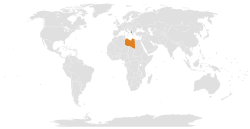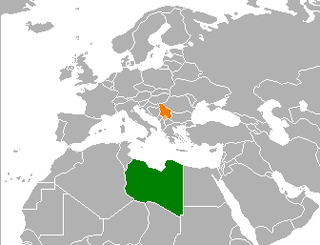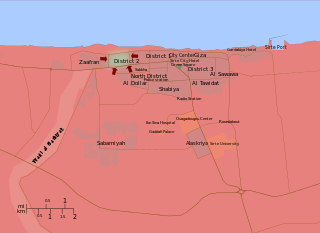 | |
Albania | Libya |
|---|---|
| Diplomatic mission | |
| Embassy of Libya, Tirana | |
 | |
Albania | Libya |
|---|---|
| Diplomatic mission | |
| Embassy of Libya, Tirana | |
On 29 March, Foreign Minister Edmond Haxhinasto said Albania would open its airspace and territorial waters to coalition forces and said its seaports and airports were at the coalition's disposal upon request. Haxhinasto also suggested that Albania could make a "humanitarian" contribution to international efforts. [1] In mid-April, the International Business Times listed Albania alongside several other NATO member states, including Romania, Bulgaria, Greece and Turkey, that have made contributions to the military effort, although it did not go into detail. [2] The Albanian Foreign Ministry announced on 18 July in a statement, "The Albanian government backs the activities of the National Transitional Council and its program for a democratic Libya, and considers the council to be the legitimate representative of the Libyan people." Even prior to recognition, Albania was a staunch supporter of the military intervention in Libya. [3] On 22 August, the Ministry of Foreign Affairs congratulated "the people of Libya ... [on] marking the end of the dictatorial regime of Muammar Gaddafi" and said it would work to strengthen bilateral relations between Tirana and Tripoli, [4] and on 23 August, Albanian President Bamir Topi congratulated the NTC on what it called "a historic moment in the deposal of one of the dictatorial regimes of our era". [5] On 29 August, the Libyan Embassy in Tirana changed its flag from Gaddafi's green banner to the tricolour adopted by the NTC. [6]

Relations between Albania and the United States of America were first established in 1912, following Albania's independence from the Ottoman Empire, ending in 1939 due to German and Italian occupation in the Second World War, and re-established in 1991 after the fall of communism in Albania and the dissolution of the Soviet Union.

Libya–United States relations refers to the bilateral relations between the State of Libya and the United States of America. Relations are today cordial and cooperative, with particularly strong security cooperation only after the 2012 attack on the US liaison office or mission in Benghazi. Furthermore, a Gallup poll conducted in March and April 2012 found that Libyans had "among the highest approval" of US leadership in the entire Middle East and North Africa region.

Libya–Russia relations is the bilateral relationship between the State of Libya and the Russian Federation. Russia has an embassy in Tripoli, and Libya has an embassy in Moscow. Diplomatic contact between Russia and Libya has generally been close and productive; seeing as both countries have had and continue to see volatile relations with the United States. Leader Muammar al-Gaddafi was a close ally of the Soviet Union, despite his country's membership in the Non-Aligned Movement; also Russia regarded Libya as one of its strongest allies in the Arab world. After the Libyan Civil War Russia has supported stabilizing the country, and since the outbreak of the new conflict it has primarily backed the Tobruk-based House of Representatives over the UN-backed Government of National Accord and various other factions.

Relations between Algeria and Libya are considerably strained by tensions between the revolutionary National Transitional Council (NTC) of Libya and the single-party autocracy of President Abdelaziz Bouteflika of Algeria. Bilateral relations were generally amicable during Muammar Gaddafi's 42-year rule of Libya.

Croatia–Libya relations refers to the current and historical relationship between Croatia and Libya. Diplomatic relations between the two countries were established on March 30, 2000. Croatia has an embassy in Tripoli. Libya has an embassy in Zagreb.

Libya–Serbia relations are diplomatic relations between Libya and Serbia. Libya has an embassy in Belgrade and Serbia has an embassy in Tripoli.

Edmond Haxhinasto is an Albanian politician who was Deputy Prime Minister of Albania from 2011 to 2013.

The First Libyan Civil War was an armed conflict in 2011 in the North African country of Libya which was fought between forces which were loyal to Colonel Muammar Gaddafi and rebel groups that were seeking to oust his government. It erupted with the Libyan Revolution, also known as the 17 February Revolution. The war was preceded by protests in Zawiya on 8 August 2009 and finally ignited by protests in Benghazi beginning on Tuesday, 15 February 2011, which led to clashes with security forces that fired on the crowd. The protests escalated into a rebellion that spread across the country, with the forces opposing Gaddafi establishing an interim governing body, the National Transitional Council.

Relations between Libya and the United Kingdom were initially close and positive after the British Armed Forces helped rebel forces to topple Muammar Gaddafi's regime in the 2011 Libyan Civil War. British officials have visited Libya several times since then, including two visits by Prime Minister David Cameron on which large crowds turned out to welcome him. The British Armed Forces are also helping to train Libya's National Army as part of wider cooperation on security matters. Security conditions have deteriorated since 2014, when the United Kingdom suspended operations from their embassy in Tripoli, into a second civil war.
The international reactions to the Libyan Civil War were the responses to the series of protests and military confrontations occurring in Libya against the government of Libya and its de facto head of state Muammar Gaddafi.

On 19 March 2011, a multi-state NATO-led coalition began a military intervention in Libya, to implement United Nations Security Council Resolution 1973, in response to events during the First Libyan Civil War. With ten votes in favour and five abstentions, the UN Security Council's intent was to have "an immediate ceasefire in Libya, including an end to the current attacks against civilians, which it said might constitute “crimes against humanity” ... [imposing] a ban on all flights in the country's airspace — a no-fly zone — and tightened sanctions on the [Muammar] Qadhafi regime and its supporters."
The international reactions to the 2011 military intervention in Libya were the responses to the military intervention in Libya by NATO and allied forces to impose a no-fly zone. The intervention was authorized by United Nations Security Council Resolution 1973, approved in New York on 17 March, in response to the Libyan Civil War, though some governments allege participants in the operation exceeded their mandate.

Moussa Ibrahim Gaddafi is a Libyan political figure who rose to international attention in 2011 as Muammar Gaddafi's Information Minister and official spokesman, serving in this role until the government was toppled in the Libyan Civil War. Ibrahim held frequent press conferences in the course of the war, denouncing rebel forces and the NATO-led military intervention, often in defiant and impassioned tones. His status and whereabouts remained unknown following the Battle of Tripoli in which the Gaddafi government was overthrown, although there were several claims and subsequent refutations of his capture. Eventually, in late 2014, it was discovered he was in Egypt before he was deported and fled to Serbia. On 12 January 2015 Moussa Ibrahim spoke publicly by video link at a political event hosted at the Committee Rooms Houses of Parliament, Westminster, London from an undisclosed location, also the Director of Private Security Company.

The foreign relations of Libya were largely reset at the end of the Libyan Civil War, with the overthrow of Muammar Gaddafi and the ongoing Second Libyan Civil War. The current Minister of Foreign Affairs in the internationally recognized executive government known as the Government of National Accord (GNA) is Mohamed Taha Siala. Although many foreign embassies in Tripoli closed down in 2014 due to the fighting, by the end of 2017 thirty diplomatic missions were reopened in the Libyan capital.

International recognition of the National Transitional Council of Libya was given by the majority of international states but was not universal.
American involvement in the Libyan Civil War initially consisted of diplomatic initiatives and sanctions. This was followed by the implementation of the UN-mandated no-fly zone, the development of diplomatic relations with the rebels as well as humanitarian aid, bombing missions to destroy Gaddafi's military capabilities, and diplomatic assistance to the rebels.

The timeline of the First Libyan Civil War begins on 15 February 2011 and ends on 20 October 2011. It begins with a series of peaceful protests, similar to others of the Arab Spring, later becoming a full-scale civil war between the forces loyal to Muammar Gaddafi's government and the anti-Gaddafi forces. The conflict can roughly be divided into two periods before and after external military intervention authorized by United Nations Security Council Resolution 1973.

Libya–South Africa relations refer to the current and historical relationship between Libya and South Africa.

Muammar Gaddafi, the deposed leader of Libya, was captured and summarily executed on 20 October 2011 during the Battle of Sirte. Gaddafi was found hiding in a culvert west of Sirte and captured by National Transitional Council (NTC) forces. He was killed shortly afterwards. The NTC initially claimed he died from injuries sustained in a firefight when loyalist forces attempted to free him, although a graphic video of his last moments show rebel fighters beating him and one of them sodomizing him with a bayonet before he was shot several times.
The international reactions to the death of Muammar Gaddafi concern the responses of foreign governments and supranational organisations to the killing of former Libyan leader Muammar Gaddafi at the Battle of Sirte, the last major engagement of the Libyan Civil War, on 20 October 2011.